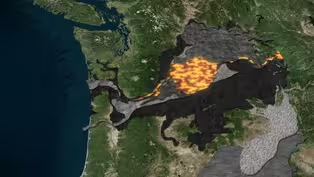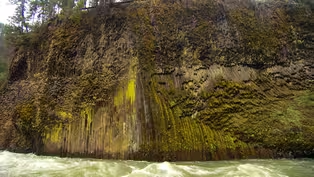Oregon Field Guide
Columbia Slough
Clip: Season 35 Episode 5 | 8m 59sVideo has Closed Captions
Exploring the surprising natural oasis of Portland's Columbia slough.
Exploring the surprising natural oasis in the most urban watershed in Oregon with the folks of the Columbia Slough Watershed Council and a dedicated volunteer helping to clean it up.
Problems playing video? | Closed Captioning Feedback
Problems playing video? | Closed Captioning Feedback
Oregon Field Guide is a local public television program presented by OPB
Oregon Field Guide
Columbia Slough
Clip: Season 35 Episode 5 | 8m 59sVideo has Closed Captions
Exploring the surprising natural oasis in the most urban watershed in Oregon with the folks of the Columbia Slough Watershed Council and a dedicated volunteer helping to clean it up.
Problems playing video? | Closed Captioning Feedback
How to Watch Oregon Field Guide
Oregon Field Guide is available to stream on pbs.org and the free PBS App, available on iPhone, Apple TV, Android TV, Android smartphones, Amazon Fire TV, Amazon Fire Tablet, Roku, Samsung Smart TV, and Vizio.
Providing Support for PBS.org
Learn Moreabout PBS online sponsorship(water lapping) - For me, it feels wonderful to paddle the Columbia Slough.
When I was a child, it was impossible.
A lot of it looked like a garbage dump.
You didn't see anything alive here.
Maybe a sewer rat.
- [Narrator] This waterway was once a dumping ground in the industrial north of Portland, the Columbia Slough.
(airplane rumbling) Anyone who's flown in or out of the PDX international airport has looked down and seen the Columbia Slough, but no doubt most folks had no idea that they were looking at Oregon's most industrialized watershed.
The Columbia Slough is a 19-mile long slack water corridor.
From Fairview Lake, it meanders westward, weaving between warehouses, sliding silently past the airport, a sewage plant, a racetrack, under two interstates, until it eventually reaches its confluence with the Willamette River near Bybee Lake and Kelly Point Park.
(traffic distantly roars) Although this watershed is only about 50 square miles, it holds more than 5% of Oregon's population.
- There's tens of thousands of people that work here, but there's over a hundred thousand people, if not more, that live here and reside in the watershed.
- [Narrator] The Columbia Slough Watershed Council wants to get residents onto the water to explore this bastion of nature in their own backyard.
- [Guide] We're going.
- We have canoes.
We have kayaks.
We have paddles.
We have life vests.
You don't have to pay to do it.
You just have to show up.
- So the two canoes together are called bimarans.
We strap them together.
It's a lot more stable of an experience.
It would be very hard to tip it over.
So if you don't know how to swim, if you're new to paddling, it feels a lot more secure and stable to be able to paddle and experience the water in that way.
- And they don't have to go buy a thousand-dollar canoe and paddles and find someplace to store it.
I mean, so many people live in apartments.
Where are you gonna put a canoe?
Nowhere.
There's nowhere to put it.
- I know brothers who actually live in North Portland that's never been to Kelly Point Park, didn't know Smith and Bybee Lakes were anywhere near there, and had no clue that Whitaker Ponds is literally in their backyard.
Like, there's a beautiful playground in your backyard, and they might see me on social media, paddling or doing something like this, and they're like, "Oh my God, that's dope.
Bro, where are you?"
They think I'm out of the country somewhere.
It's like, "No, I'm seven minutes from your house."
- [Narrator] The slough was once free-flowing and flooded seasonally with the Columbia River, creating a dynamic wetland, and an abundant home for birds and wildlife.
- [Announcer] Here is America's answer!
It can be done!
- [Narrator] During World War II, a marshy area of the slough was developed to house the workers of the shipyards.
In 1943, a city of some 40,000 people called Vanport sprung up almost overnight.
- The shipyards needed labor.
They recruited a lot of people, and a lot of those people were people of color.
- [Narrator] But shortly after the war, in 1948, Vanport was destroyed by flood.
- A lot of people, like my family, they were gonna go back to Chicago, but all of their things got washed away, so they were stuck living here in Portland, and that's why I'm here today.
It's because of that flood.
- [Narrator] In the decades that followed, the city of Portland grew.
Zoning concentrated heavy industry here, the floodplain became channelized, and the stagnant water was seen as a place to dump garbage and sewage.
The Columbia Slough became one of the most polluted waterways in the state.
- And it wasn't until the people that lived near here started really advocating to clean it up that that clean-up started to happen.
- [Narrator] Starting in the 1990s, volunteers rallied to clean up Whitaker Ponds, at the center of the slough, transforming a dump site into a public park, but as recently as a couple years ago, a local resident, Paul Taylor, found that there was still a great deal of clean-up to do.
- I came to the slough because it was close to home.
It's a narrow, natural corridor, so you see a lot of wildlife, and I would come out quite a bit, and I would go home and my wife would ask me how the paddle was, and I would say, "Yeah, it was really good, except there's so much trash.
It's kinda, like, you know, harshing my mellow a little bit."
So, you know, this cycle kind of repeated itself several times until my wife finally said, "You know, you can either ignore the trash or you can do something about the trash, 'cause I am not listening to you complain about the trash anymore."
So I adopted a two-mile stretch of the Columbia Slough.
I have been coming out for the last three years, two to five times a week, and I collect the trash in my kayak, and I have a couple of depots along the slough where I store it, and then I come around in my car and I pick it up and it gets disposed of.
One tire at a time, you know?
You do one a week, and then, before you know it, you've collected 140 tires.
(Paul chuckles) - [Narrator] Despite the proximity to freeways and the airport, down at the water's level, folks feel transported to a more natural and wild place.
More than 150 bird species can be spotted along the slough, like eagles, egrets, and great blue heron.
(bird squawks) And a variety of other wildlife, like western painted turtles, beaver, and even coyotes.
- Oh!
- Where?
- [Pamela] It is a coyote!
Look at that.
- Whoa.
That's wild.
- [Pamela] I've never seen a coyote out here.
(jet roars) - [Amanda] You'll hear the occasional plane, you'll hear the occasional semi maybe passing, but everything really just slows down and quiets down when you're on the water.
(bird squawking) (water lapping) (birds chirping) - When I look around while I'm paddling the slough, it feels like I can be anywhere, like I'm transported to a completely different place, and when you hear, like, a choir of bird song, it's one of the most relaxing and calming sounds I can think of right now, and, immediately, I can feel my blood pressure lower.
So this is like heaven for me.
This is heaven on earth.
- [Narrator] The Columbia Slough has come a long way, and more people than ever are claiming their connection to it, but there is still work to do.
- This land has such a story of resiliency, and, to me, it represents hope.
- We hear so many bleak messages in terms of the future, in terms of climate, and we wonder if there's any hope, but you can visit Whitaker Ponds and that'll tell you right there that there's definitely hope.
(no audio) (no audio) - Great people just doing their thing in their own northwest-y way.
We love bringing you stories like this.
Support what you love.
OPB.org/video.
Video has Closed Captions
Clip: S35 Ep5 | 10m 10s | A geologic road trip explored a mystery that extends from central Washington to the Oregon Coast. (10m 10s)
Video has Closed Captions
Clip: S35 Ep5 | 1m 52s | The North Umpqua River is lovely in the rain. (1m 52s)
Providing Support for PBS.org
Learn Moreabout PBS online sponsorshipSupport for PBS provided by:
Oregon Field Guide is a local public television program presented by OPB

















